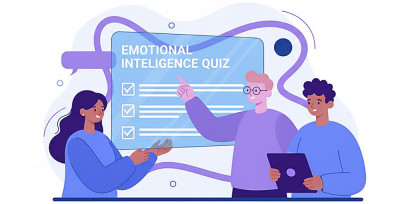Emotional Intelligence Quiz > Measure Your EQ Online
New Updates



Take Emotional Intelligence Quiz
Get StartedTest Your EQ: Discover Your Emotional Superpowers Today!
Understanding and nurturing emotional intelligence is more crucial than ever. An emotional intelligence quiz is a valuable tool for assessing our emotional awareness and capabilities. These quizzes provide insights into how we perceive, understand, and manage our emotions and the emotions of others. But how do these tests work, and what benefits do they offer? Let's delve into the world of emotional intelligence tests and discover their importance in both personal and professional realms.
What Is an Emotional Intelligence Quiz?
An emotional intelligence quiz evaluates one's ability to recognize and manage emotions, both personally and in relationships. Unlike traditional IQ tests, which focus on cognitive abilities, these quizzes measure emotional competencies. By taking an EQ test, individuals can gain a better understanding of their emotional strengths and development areas.
Quizzes vary in format, ranging from simple self-assessment tools to comprehensive assessments like the Mayer-Salovey-Caruso emotional intelligence test (MSCEIT). These tools are designed to offer insights into key areas such as self-awareness, self-regulation, motivation, empathy, and social skills. Understanding these aspects can be pivotal in honing one's interpersonal skills and boosting overall emotional well-being.

Why Take an Emotional Intelligence Quiz?
- Improved Self-awareness: Discover personal emotional triggers and responses.
- Enhanced Communication: Better navigate social and professional interactions.
- Relationship Management: Foster stronger, more empathetic connections.
- Professional Growth: Essential for leadership and teamwork.
- Stress Management: Navigate emotional challenges with resilience.
Comparing the Main Emotional Intelligence Test Types
There are various kinds of emotional intelligence quizzes available, catering to different assessment needs. A test EQ can be as simple as a self-report emotional intelligence test, where individuals answer questions about their own emotional habits and tendencies. This format is user-friendly and offers instant feedback.
On the other hand, psychometric tests of emotional intelligence are more structured, offering quantitative data on emotional proficiency. The Mayer-Salovey-Caruso emotional intelligence test is a renowned example in this category. It measures not only recognition of emotions but also the application of emotional reasoning in solving real-world problems.
For those seeking a quick and straightforward assessment, the quick emotional intelligence test is an excellent option. These assessments are designed to provide a snapshot of one's emotional intelligence without delving into too much detail, making them ideal for busy individuals who need quick results.
Comparing Emotional Intelligence Tests
| Test Type | Format | Duration | Depth of Analysis |
|---|---|---|---|
| Self-report Test | Questionnaire | 10-15 minutes | Basic overview |
| Psychometric Test | Structured assessment | 30-45 minutes | In-depth analysis |
| Mayer-Salovey-Caruso Test | Problem-solving tasks | 60-90 minutes | Comprehensive evaluation |
How to Use the Results of an EQ Quiz
Once you've completed an emotional intelligence appraisal test, the results can provide a wealth of information to enhance personal and professional development. Scores from an emotional intelligence test assessment often highlight key areas of strength and opportunities for improvement.
Utilizing the outcomes of a test emotional intelligence assessment, individuals are guided in establishing feasible objectives for personal development. For instance, should the evaluation highlight a lower empathy rating, it would be beneficial to concentrate efforts on exercises and training designed to foster a deeper empathetic understanding. Alternatively, if the results show that you possess a strong capacity for social awareness, this skill can be capitalized on to enhance team dynamics and lead projects with increased effectiveness.
Implementing Results in Everyday Life
- Set personal development goals based on assessment findings.
- Engage in activities that target specific emotional skills.
- Seek feedback from peers and mentors.
- Track your progress over time to ensure continuous improvement.
- Create action plans to address the weaker areas identified.
Take Emotional Intelligence Quiz
Get StartedFrequently Asked Questions
-
What is the purpose of taking an emotional intelligence test and quiz?
The purpose is to gauge one's emotional capabilities, providing a benchmark for personal development and interpersonal understanding.
-
How does the Mayer-Salovey-Caruso emotional intelligence test differ from other tests?
This test focuses on problem-solving using emotional information, offering an in-depth analysis of an individual's emotional functioning.
-
Can results from an EQ test online be as reliable as traditional methods?
Yes, many online tests use scientifically backed models to deliver accurate and reliable results.
-
What are emotional intelligence quiz answers based on?
Answers reflect one's perceived abilities to handle emotions, both personally and socially, formulated from self-awareness and self-reporting.
-
Are psychometric tests of emotional intelligence suitable for everyone?
Yes, these tests are designed for a broad audience, ranging from students to professionals, ensuring inclusivity and relevance.
 EQ Tests Explained: Benefits for Work, Life, and Leadership
EQ Tests Explained: Benefits for Work, Life, and Leadership
